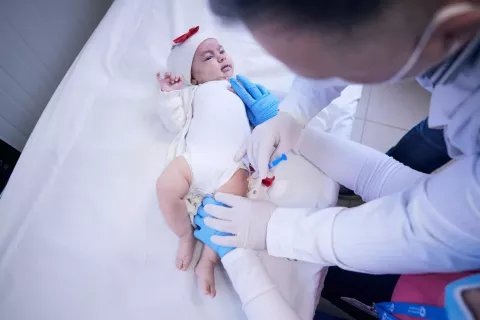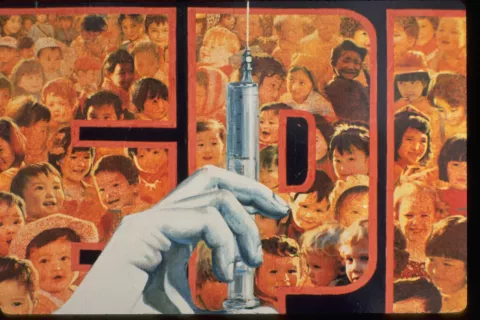Vaccinating a child during an emergency is more important than EVER
Exploring barriers to routine immunization among refugee mothers from Ukraine and healthcare providers in Poland

- Available in:
- English
- Polish
Highlights
During the European Immunization Week, UNICEF's Refugee Response in Poland published a report on a study conducted in collaboration with the Mother and Child Institute Foundation, Yale School of Medicine, and the European Centre for Disease Prevention and Control. The report focuses on factors that facilitate and barriers that hinder the participation of refugee-experienced children in routine vaccination programs.
The research revealed that over one-third of mothers from Ukraine in Poland, whose children have not yet reached the age of seven, do not know how to vaccinate their children in Poland. In response to these findings, actions are necessary not only to rebuild trust in the effectiveness and safety of vaccinations but also to promote vaccination among families living in Poland.
Experts examined the impact of communication about vaccinations on the decision-making process of mothers from Ukraine. Testing different messages aimed to determine which of the three narratives would influence the decision to schedule children for vaccination appointments (through a link provided in the study). The results showed that the most effective message emphasized the unique situation of residents from Ukraine, which led to an increase in the number of vaccination registrations through the link provided in the study.
Decisions regarding participation in protective vaccinations are shaped by various factors. The Behavioral and Social Determinants of Immunization (BeSD) framework indicates that cognitive and emotional elements, along with social dynamics, play key roles in motivating individuals to get vaccinated. Moreover, the way information about vaccinations is presented can significantly affect the decision to get vaccinated or not, hence the importance of how the communication is phrased.
"Low vaccination rates mean that both refugees and host communities are at risk of preventable diseases. UNICEF continuously works to protect children from diseases, which is why we collaborate not only with government authorities, local partners, and organizations but also listen to the voices of those we help to better understand their behaviors and reach them with messages that positively influence their vaccination decisions" - says Nona Zicherman, National Coordinator of UNICEF's Refugee Response Office in Poland.
This report summarizes the findings of mixed-method research, using both qualitative and quantitative studies, to identify factors influencing the participation of refugee children from Ukraine in Poland in routine vaccinations.






